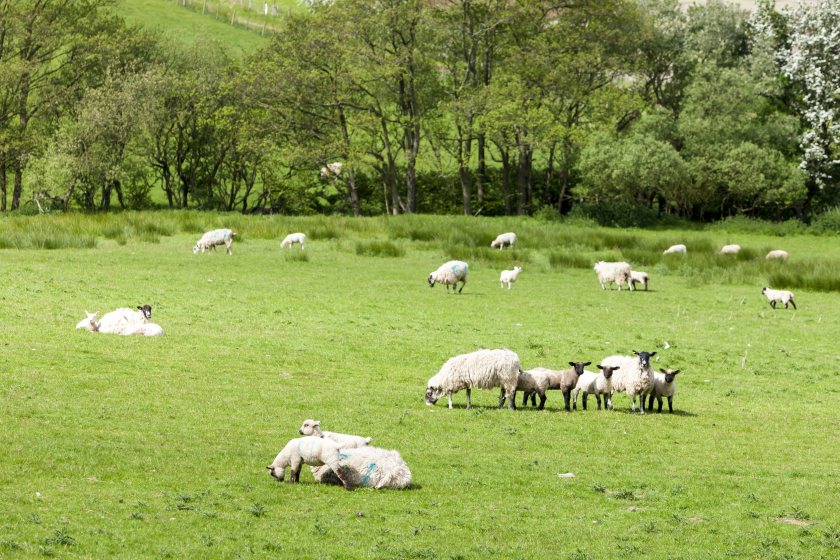
Sheep farmers are being urged to act now to prevent devastating lamb losses, as new data reveals widespread exposure to abortion-causing diseases ahead of the crucial tupping season.
The warning follows the latest FlockCheck 2025 findings, which reveal that 79% of nearly 400 farms tested showed exposure to Toxoplasma gondii, and 35% to Chlamydia abortus, the bacterium responsible for EAE.
Despite the availability of effective vaccines such as Toxovax® and Enzovax®, uptake remains alarmingly low, with more than 60% of flocks still not routinely vaccinated.
Veterinary surgeon Sarah Smith from the George Veterinary Group in Wiltshire is calling on farmers to assess their flocks now and ensure vaccination is completed at least four weeks before tupping begins.
“These are preventable diseases that can cause devastating losses. Yet many farmers don’t realise they’ve had an issue because losses go unrecorded or unexplained,” said Mrs Smith.
“Now is the critical window for action. If you’ve had barren rates or abortion losses over 2% or poor lamb numbers last season, speak to your vet, investigate potential causes and depending on test results, plan to vaccinate. Waiting until the autumn may be too late.”
Additional findings from MSD Animal Health’s Flock Health Checklist Survey, which surveyed over 960 UK sheep farmers in 2024, paint a concerning picture of poor flock performance tracking and under-investigation of disease.
The survey found that 42% of farmers do not know their lamb loss rate, while 31% are unaware of their ewe barren rate.
Additionally, 33% of farmers do not investigate abortion cases, and 62% do not vaccinate against either enzootic abortion (EAE) or toxoplasmosis.
Among open flocks that had not been vaccinated, 69% reported lamb losses exceeding 15% or were unable to state their loss rate—compared with 55% in vaccinated or closed, monitored flocks.
Mrs Smith stressed that even basic record-keeping can help drive significant improvements: “Some farmers use EID and handheld readers; others use a notebook. Both work – what matters is capturing the information and reviewing it regularly with your vet.”
Dr Kat Baxter-Smith, Veterinary Adviser at MSD Animal Health, said the survey results clearly show that proactive management pays off.
“Vaccination and monitoring go hand in hand. Farmers who track their performance and take action, such as vaccinating for infectious abortion, consistently report lower lamb losses and fewer problems.
"It’s frustrating to still see so many farmers dealing with avoidable losses when the tools are available.”
Mrs Smith is encouraging farmers to take a risk-based approach to abortion vaccination this summer—particularly those with open flocks, unknown flock history, or past issues with high barren rates or lamb losses.
“If disease is present in the flock or you are buying in from flocks of unknown status, the cost of vaccination can easily be offset by reducing future barren rates and abortion losses,” she explained.
“Non-pregnant ewes can be vaccinated anytime up until four weeks prior to tupping, but there’s no need to wait that late. Summer provides the ideal opportunity to vaccinate.”
She also advised caution when purchasing breeding ewes late in the season, as they may not be vaccinated in time for tupping. In these cases, she recommends quarantining them for a full breeding cycle.
“Introducing enzootic abortion into a naïve flock could cause a big problem next spring with losses,” she warned.
Both vaccines offer long-lasting protection—Enzovax® is typically required every 3–4 years, while Toxovax® has been shown to protect for at least two lambing seasons.
“That means once you’re on top of it, the long-term management is straightforward,” added Mrs Smith.
She also highlighted the importance of considering bluetongue vaccination this summer, as the disease can cause high abortion rates and fertility problems in rams.
Farmers in England can access support through the Animal Health and Welfare Pathway, which offers fully funded annual vet visits to assess flock health and identify disease risks.
“This is a fantastic opportunity to sit down with your vet, review performance, and plan your health strategy before tupping. Don’t let another season go by without doing something,” urged Mrs Smith.
